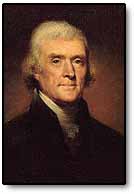|
For years it was denied being possible and it still is by
some adamant, cynical people. What I'm referring to is the relationship
between former U.S.
President Thomas Jefferson and one of his slaves, Sally Hemmings.
Through DNA testing it has been proven that not only were they
romantically involved, but that he fathered at least one of her
children.
The descendants of Eston Hemmings have long suspected the
connection between them and Jefferson, despite many objections
by some historians. They soon had their day of glory however.
The method used was that of tracking unchangeable Y-chromosome
markers that pass from father to son, continuing from generation
to generation. The blood of descendants of Jefferson's paternal
uncle was compared to that of some of the male descendants of
Eston Hemmings. The results proved virtually conclusive. The
connection was made. |

Thomas Jefferson the
third U.S. President |
At the time of Jefferson's Presidency, the possession of slaves
was not only normal, but many in the United States felt this
was the only use for African-Americans. Jefferson himself was
a slave-holder, and he broke the master-slave relationship, becoming
romantically involved with Hemmings.
This is a controversial and confusing paradox. On one hand
we have the testimony of the Declaration of Independance, where
Thomas Jefferson stated,"...all men are created equal, that
they are endowed by their Creator with certain unalienable Rights,
that among these are Life, Liberty and the pursuit of happiness."
Yet, on the other hand we have his words in an 1814 letter, "The
amalgamation of whites with blacks produces a degradation which
no lover of his country, no lover of excellence in the human
character, can innocently consent." Was Jefferson going
against his 'moral character' in having a relationship with Sally
Hemmings? Or did he resign himself to trying to receive the approval
of his fellow countrymen?
Sally Hemmings, born in 1773, was the daughter of Elizabeth Hemmings
and John Wayles, the father-in-law of Thomas Jefferson. Jefferson
received Sally as an inheritance in 1774 and she and her mother
came to Monticello in 1776. Her job as a child was most likely
the duty of 'nurse' to Jefferson's daughter Mary. At the age
of 14, Sally accompanied 8 year old Mary to France, who was going
there to be closer to her father. There she was trained in needlework
and how to care for clothing, in order to be a true lady's maid.
Sally was treated well, even paid a small amount of money. As
Mary's sister Martha, began to go out into French society both
she and Sally were afforded more expensive clothing.
Upon the family's return to Monticello in 1789, Sally maintained
her position as lady's maid, but also had the responsibility
of caring for Jefferson's chamber and clothes, the children,
and other light duties such as sewing. She eventually had her
own room in the house itself, not with the other slaves. This
was unusual treatment for a slave in the late1700's. Perhaps
some of the attraction that Jefferson felt was partly because
she was very light in complexion, with long straight, dark hair,
and apparently very beautiful. Some believe that it wasn't just
attraction, that love was involved. Whatever the case may be,
while at Monticello, Sally had four surviving children. Eventually
they were allowed to leave the plantation and were passed into
white society.
This illegal liaison was certainly looked down upon, both
at the time, and now as well, by some, and denied possible as
well. However, with the near-conclusive genetic testing that
also corroborates with historical evidence (such as Jefferson
was the only Jefferson male at Monticello each time Sally conceived,
eliminating the possibility of the children being fathered by
another Jefferson), historians who once "felt strongly that
Jefferson was morally incapable of coupling with a slave"
have had to at their words. It was not uncommon for a white man
to force himself upon a female slave at this time, however this
affair seems to involve something more, something mutually consensual.
Love perhaps?
The only inescapable fact that taints their relationship is
the fact that indeed, Jefferson owned Hemmings. He had in his
power the ability to treat her any way that he pleased, could
control her to the enth degree and she had no laws to protect
her from even being murdered. In the words of one documentary
film-maker, "...We need no DNA to remind us of the stain
of slavery." This shameful period in American history enveloped
Thomas Jefferson, and being the President of the country that
promoted slavery, was he in the position to be setting new precedents,
making many powerful enemies? Unfortunately, it seems as though
in order for him to maintain his standing in government that
he couldn't, or at least it seemed impossible.
The story of Sally Hemmings and Thomas Jefferson reminds us of
times gone past, of deep-set prejudices we see in the world around
us today. There are those who would romanticize their relationship,
and there are those who would disqualify any possibility of love
between them. The debate will probably continue as long as there
are narrow-minded people willing to challenge the family legacies
of their descendants. The truth lies only in the minds of Thomas
Jefferson and Sally Hemmings. There it will stay for eternity
while we are fascinated by the complexities and complications
of their memorable affair. |